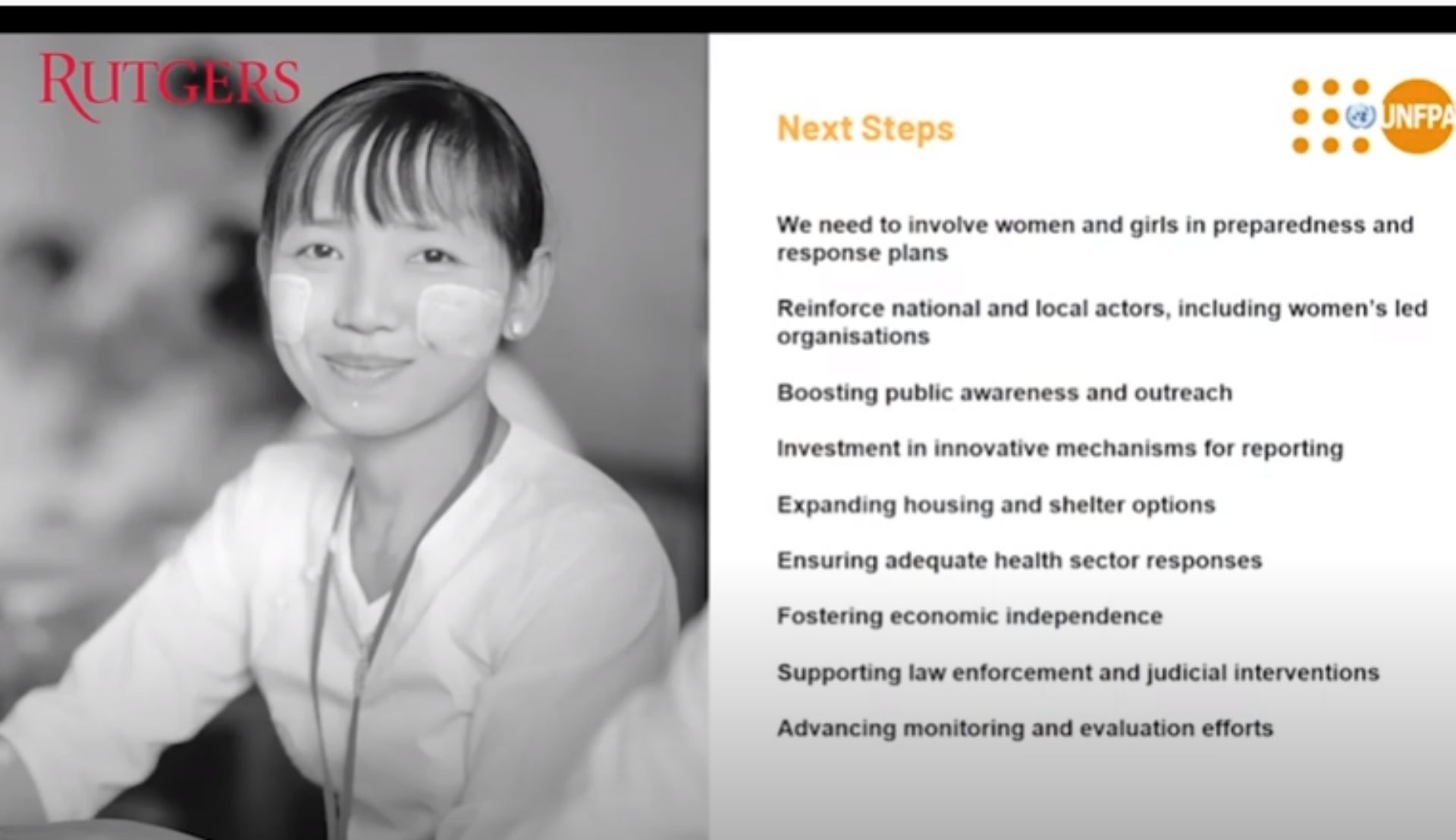Though the full effects of the impact of COVID-19 on our population are yet to be known, it is instructive to look at the effects on women around the world a year into the pandemic. On April 26, 2021, Rutgers Global hosted a panel discussion titled “COVID-19: Worldwide Consequences on Women” to explore this important topic, especially with regard to the areas of sexual and reproductive rights, labor, and violence against women and girls during the pandemic.
Anu Gupta, Assistant Dean for International Academic Support at Rutgers Global, who organized the panel discussion noted, “This panel discussion was illuminating and we were grateful to have such an impressive roster of panelists, but this is really only the beginning of the conversation. We hope to continue this topic in further panel discussions organized as a series on the impact of the pandemic on women worldwide.”
To begin the conversation, Gupta introduced Laura Turquet, Policy Advisor and Deputy Chief of the Research and Data team at UN Women, to give an overview of the data we currently know. Turquet is also co-author and manager of UN Women’s flagship report: Progress of the World’s Women: Families in a Changing World.
The first panel discussion was on the topic of sexual and reproductive health and rights and was led by Professor Yana van der Meulen Rodgers of the Department of Labor Studies & Employment Relations, and Department of Women & Gender Studies, as well as the Faculty Director of the Center for Women and Work at Rutgers University. She was joined by Giselle Carino, CEO of International Planned Parenthood Federation Western Hemisphere Region, and based in Argentina, and Beirne Roose-Snyder, Director of Public Policy at the Center for Health and Gender Equity (CHANGE). As the panel shared, in addition to the risk posed to women due to exposure to the virus because they make up 70% of the health workforce, they are particularly vulnerable because of the diversion of resources and services away from sexual and reproductive health. This can exacerbate maternal mortality and morbidity, increase adolescent pregnancies, and incidence of HIV and other sexually transmitted diseases.
The next panel discussed the impact of the pandemic on women and labor. Professor Rodgers introduced the two panelists: Mary Njeri Kinyanjui, PhD, from the University of Nairobi-IDS and based in Kenya, and Professor Ousseina D. Alidou, PhD from the Department of African, Middle Eastern and South Asian Languages and Literatures at Rutgers University. As the panelists explained, the economic fallout due to COVID-19 has had a particular devastating effect on women and gender equality. The existing gender inequalities has left women more vulnerable than ever because of factors such as: women’s rising share of unpaid work (childcare, caring for the elderly, cooking, cleaning); disproportionately higher job loss rates; and lack of employment-based social protection to women in the informal economy, which makes up 70% of women’s employment.
For the final panel topic on violence against women and girls, the moderator was Rebecca Mark, Director of the Institute for Women’s Leadership at Rutgers University and the panelists were Alexandra Robinson, Gender Based Violence Advisor at the United National Population Fund, calling in from Fiji, and Rebecca (Linchi) Hsu, PhD, Assistant Professor in the Department of Economics at Howard University. The panelists shared that there is growing evidence that the pandemic has resulted in an increase of violence against women and girls. This increase is in part due to confined living conditions and tensions from security, health, and money worries. In addition, lockdowns have caused a spike in reported cases of domestic violence. Even the data that is available is most likely showing underreported numbers.
To see a recording of the event, “COVID-19: Worldwide Consequences on Women,” please see:
https://www.youtube.com/watch?v=U6gtjBrzulY

